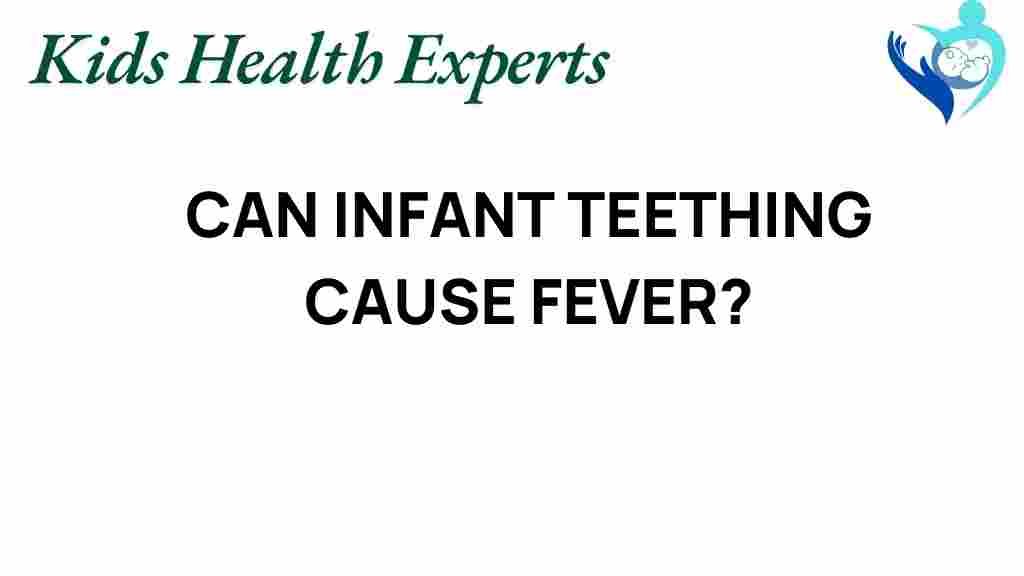The Surprising Link Between Infant Teething and Fever
As a parent, the journey through your child’s early years is filled with numerous milestones, one of the most notable being infant teething. This natural process can be a challenging time for both babies and parents alike. While teething is often accompanied by various symptoms, many parents wonder about the possibility of fever during this period. In this article, we will explore the surprising link between infant teething and fever, delve into the symptoms, provide pediatric advice, and offer effective teething remedies. We will also debunk some common health myths surrounding this topic.
Understanding Infant Teething
Infant teething typically begins around six months of age, although it can start as early as three months or as late as twelve months. During this time, babies experience the emergence of their first set of teeth, which can lead to several noticeable symptoms.
- Increased drooling: Teething often stimulates saliva production, leading to drooling.
- Chewing on objects: Babies may gnaw on toys, fingers, or other objects to relieve discomfort.
- Irritability: The discomfort from teething can make babies more fussy than usual.
- Changes in eating habits: Some infants may refuse to eat or drink due to gum pain.
Common Symptoms of Teething
Recognizing the symptoms of teething is essential for ensuring your child’s comfort. Here are some typical signs:
- Swollen or tender gums
- Low-grade fever (often a point of confusion)
- Difficulty sleeping
- Rubbing the face or pulling at the ears
- Increased fussiness or crying
Interestingly, many parents report that their child experiences a mild fever during teething. This leads to questions regarding the connection between infant teething and fever.
The Fever Connection: What Pediatric Advice Says
The phenomenon of fever during teething can be perplexing. Pediatricians often clarify that while a teething baby can have a temperature, it should not exceed 100.4°F (38°C). If your baby’s temperature is higher than this, it is advisable to consult a healthcare professional as it may indicate an illness unrelated to teething.
In summary, teething can cause a mild increase in body temperature, but it is not the direct cause of significant fevers. Parents should monitor their child’s symptoms closely and seek medical advice if they notice any concerning signs.
Debunking Health Myths About Teething and Fever
There are several health myths that surround teething and fever. Here are a few common misconceptions that need to be addressed:
- Myth 1: Teething causes high fevers.
- Myth 2: Teething always leads to diarrhea.
- Myth 3: Teething symptoms are the same for every child.
Understanding these myths can help parents make informed decisions about their child’s health and well-being. Always rely on pediatric advice and consult with healthcare providers when uncertain.
Effective Teething Remedies
When your baby is going through teething, providing comfort is crucial. Here are some effective teething remedies that can help soothe your little one:
- Cold compress: Apply a clean, damp washcloth that has been chilled in the refrigerator to your baby’s gums.
- Teething rings: Use rubber or silicone teething rings, preferably those that can be chilled for extra relief.
- Massage: Gently massaging your baby’s gums with a clean finger can provide relief.
- Over-the-counter pain relief: Consult your pediatrician about using age-appropriate pain relievers if necessary.
While these remedies can help ease discomfort, it’s essential to ensure that any tools or toys your baby uses are safe and free from harmful chemicals.
Step-by-Step Process for Managing Teething Symptoms
Managing teething symptoms can be a straightforward process. Here’s a step-by-step guide:
- Observe your baby: Keep an eye on signs of teething, such as drooling, irritability, and low-grade fever.
- Provide comfort: Use cold compresses, teething rings, or massage to soothe their gums.
- Monitor fever: Take your baby’s temperature regularly. If it exceeds 100.4°F, consult a pediatrician.
- Maintain routine: Stick to your baby’s regular feeding and sleeping schedule to provide a sense of normalcy.
- Seek advice: If symptoms persist or worsen, do not hesitate to contact your pediatrician for further guidance.
Troubleshooting Common Teething Challenges
Even with the best remedies, teething can be a tough time for parents. Here are some troubleshooting tips:
- If your baby is refusing to eat, try offering soft foods or cold purees to soothe their gums.
- If irritability seems excessive, ensure they are well-rested and check for any other underlying symptoms.
- For excessive drooling, keep a bib handy to prevent rashes on the chin and neck.
- If you notice any other symptoms such as diarrhea or a persistent high fever, consult your pediatrician immediately.
Conclusion
The journey of infant teething can be filled with challenges, but understanding the connection between teething and fever can help parents navigate this phase with greater ease. By being informed about symptoms, debunking health myths, and utilizing effective teething remedies, you can ensure your child remains comfortable during this significant developmental milestone.
Always remember, parenting comes with its unique set of challenges, but with the right knowledge and resources, you can provide the best care for your little one. For more parenting tips and resources, check out this informative article. Additionally, for more detailed pediatric advice, visit the American Academy of Pediatrics’ website.
This article is in the category Conditions and created by KidsHealthExperts Team
